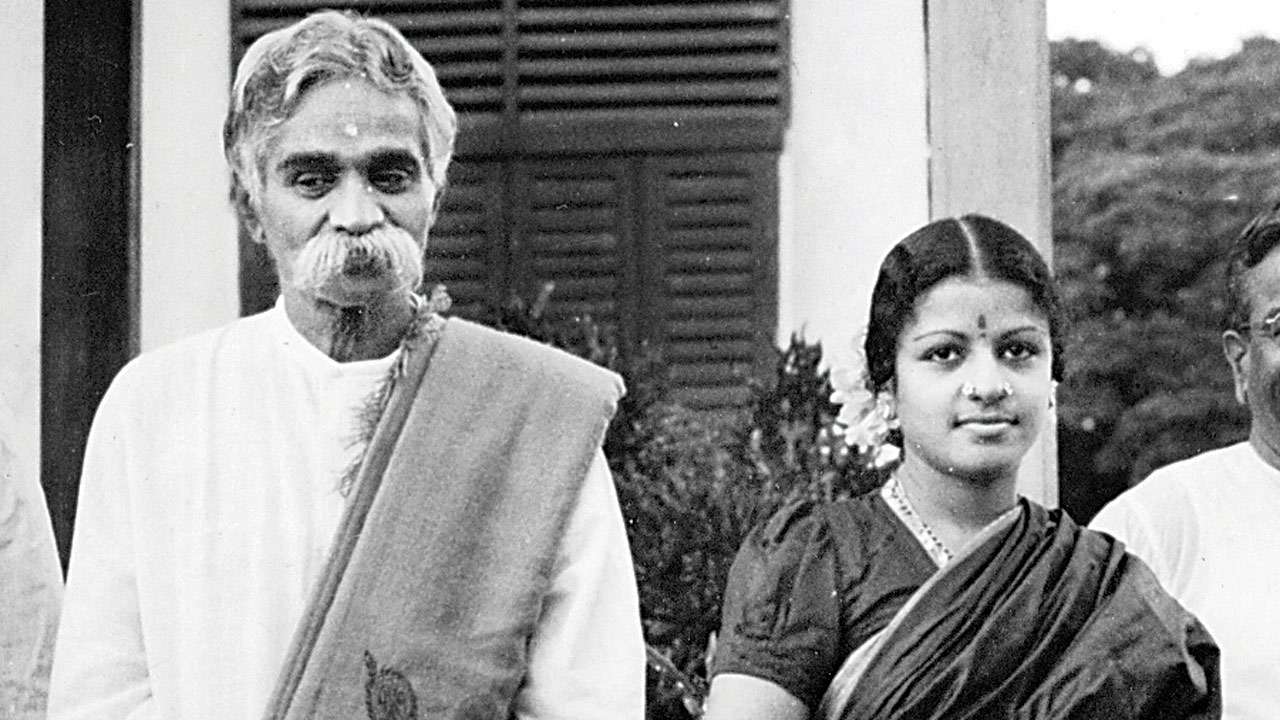
Only from the portrait hanging at home did I know the handsome, immaculately dressed old man with twinkling eyes, beaming smile and bushy mustachios. However, fond recollections by three generations of family members made him an intimate presence in my life. This man lived in a small town where he did nothing but hold court before spellbound listeners. Exactly what he did when he came on periodic visits to our home in old Madras.
It will be hard for people living today to believe that his sole subject of discourse was Tamil poetry. TK Chidambaranatha Mudaliar (TKC) had given up a lucrative career in law, and political prominence in the Justice Party, to do nothing but enjoy poetry, and share what he read with others. Among his listeners were writers, thinkers and legendary renaissance artists like MS Subbulakshmi, Balasaraswati and Rukmini Devi. Rajaji was his close friend and consulted him on matters literary. Mahatma Gandhi was charmed by his narrative as was Jawaharlal Nehru, who hosted him in his prime ministerial home in Delhi.
TKC remained the elder statesman of our family even though he belonged to a different caste and community, with some affiliations to a political party that my freedom fighting clan opposed. Yet my grandparents did nothing – from launching a nationalist magazine, to fixing a daughter’s marriage – without consulting him.
TKC’s impact was not confined to bigwigs. My grandma had never stepped into a school. However, as she made dosa, ground chutney or churned curd, she made her kitchen ring with songs from ancient and medieval Tamil. Infected by this Tamil poetry mania, my mother never failed to pepper her lectures and complaints with admonitory verses from irascible Tamil bards. She could also reel off romantic stanzas from Kamban’s Ramayana and moving pleas by innumerable saint poets.
What I most loved from this selection were witty verses about poets themselves and about the nature of poetry: “One day a destitute poet found a woman who gave him a pot of what she called “buttermilk”. The poet burst into a song of gratitude, not without honesty. “O delicious nectar!” he exclaimed. “Floating in the skies you were named cloud, when you drenched the earth you were called rain. In the hands of this good, generous lady you have acquired a new name: Buttermilk!” Another anonymous poet sings about how, just before entering the munificent art patron’s home, he had bid goodbye to his lifelong companion: Poverty. A clever man seeking rewards from a rich donor? Yes, but doesn’t the poem also contrast destitution (suffering, attrition, ignorance, darkness) with generosity (unselfish sharing, supporting talent, protecting the weak, upholding truth, commitment to goodness, spreading light)?
Tamils had always personified their language as a goddess of unmatched beauty and power, but with rising politicians in independent India, the deity became an omnipotent symbol to assert Dravida identity. English was the enemy, Hindi was the tool of the North to subjugate the South. A frenzied Tamil rhetoric was promoted by the Dravida movement led by CN Annadurai and M Karunanidhi. A new, aggressive poetic discourse sloganeered their ideology, dominating the lives of the Tamils through drama and cinema. The drumming was loud and direct.
But I remembered a different strain of poetry, detailed by TKC, also centre staging Tamil, but with subtle image and nuanced metaphor. A connoisseur king insists on hearing his own elegy composed by the minstrel he adores, even though he knows that if recited in his presence, the poem would turn into a spell of death. Isn’t this life-risking, protective passion for his culture and for his people? Then there’s the poet Avvai who welcomes three great kings to her granddaughter’s wedding. Her royal guests demand off-season palm fruit for lunch. Undaunted, Avvai orders the lampstand carved from a palm tree trunk to “sprout leaves and bear fruit!” Her impeccable verse achieves the goal. No one takes these stories literally. The metaphors underscore the power of poetry: To destroy and to rejuvenate.
TKC’s published writings and personal letters say, “A writer can make us empathise with characters we like as well as dislike. Literature performs transformational magic to make us understand the good and the bad, so that we acquire culture, which is essentially tolerance, fostering world harmony.”
I finally understand why Tamil Nadu venerates poetry and believes that temples are sanctified not by rituals alone, but when poets write verses about them. Here the magnificent Thanjavur temple attracts tourists, but even little temples where great poets sang draw pilgrims. Why? Because the ancient Tamils knew that you can access your culture through the best expressions in your mother tongue. Such poetry strengthens you to cherish your heritage, but also to appreciate other cultures, other languages, other peoples — beyond your horizon.
Author is a playwright